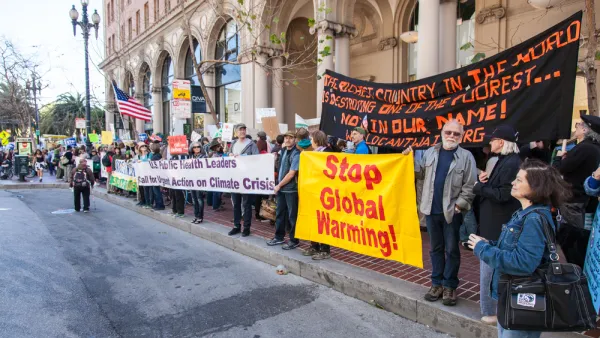The Nobel Prize was issued the same day as a landmark report by the IPCC predicting dire consequences if emissions aren't reduced. That's what William D. Nordhaus of Yale University has devoted his career to addressing.

"The announcement of the award came on the same day that a United Nations panel on climate change released a report warning of dire consequences from climate change and urging governments to respond to the problem with greater urgency," reports Binyamin Appelbaum for The New York Times.
Professor William D. Nordhaus, 77, of Yale University was honored for pioneering the assessment of the economic impact of climate change, including his advocacy for governments to tax carbon emissions. Professor Paul M. Romer, 62, was honored for his work on the role of policy in encouraging technological innovation.
The Nobel Prize committee cited Mr. Nordhaus for his work in showing that “the most efficient remedy for problems caused by greenhouse gases is a global scheme of universally imposed carbon taxes.
Climate change took on outsized importance to Nordhaus from the get-go, according to the Nobel's background paper on the award, "Integrating nature and knowledge into economics" [pdf]:
In the 1970s, when he was a young faculty member at Yale University, William Nordhaus keenly studied the emerging evidence on global warming and its likely causes and concluded that he had to do something. His concern was channelled into devising new tools to help us understand how the economy can generate climate change, as well as the societal consequences of climate change. He wanted to develop a framework that allowed climate change to be analysed in terms of costs and benefts. .
Both professors addressed market externalities and the need for government intervention to correct market inefficiencies.
The externalities studied by Romer and Nordhaus have global reach and long-term consequences. As unregulated markets will generate inefficient outcomes in the presence of such externalities, the work of Romer and Nordhaus provides convincing arguments for government intervention.
According to Nordhaus' research, the most efficient remedy for the problems caused by greenhouse gas emissions would be a global scheme of carbon taxes that are uniformly imposed on all countries. This recommendation builds upon a result formulated in the 1920s by a British economist, A.C. Pigou, namely that each emitter should pay the societal cost of the damage caused by their emissions via an appropriate price.
IPCC report
The landmark report by the Intergovernmental Panel on Climate Change (IPCC), released Oct. 8 in Incheon, South Korea's third largest city, goes by the shortened title, "Special Report on Global Warming of 1.5°C."
"Limiting global warming to 1.5°C [or 2.7 degrees Fahrenheit] would require rapid, far-reaching and unprecedented changes in all aspects of society, the IPCC said in a new assessment," states the summary for policymakers. "With clear benefits to people and natural ecosystems, limiting global warming to 1.5°C compared to 2°C could go hand in hand with ensuring a more sustainable and equitable society."
"Right now, the world is not on track to stay under the 1.5-degree mark," writes Dino Grandoni for The Washington Post. "Existing promises under the Paris agreement, which give countries wiggle room to come up with ways of meeting emissions targets, would lead to about 3 degrees Celsius of warming by 2100."
PBS NewsHour covered the report (transcript and video) on Monday night, with one of the two guests pointing to the importance of Nordhaus' work. "The [carbon] tax is the most efficient mechanism we have," said Rafe Pomerance, a senior policy fellow at the Woods Hole Research Center and chairman of Arctic 21, a network of scientists working to draw attention to the effects of warming on the Arctic. "It needs not only to exist in the United States. It has to exist globally."
FULL STORY: 2018 Nobel in Economics Is Awarded to William Nordhaus and Paul Romer

Analysis: Cybertruck Fatality Rate Far Exceeds That of Ford Pinto
The Tesla Cybertruck was recalled seven times last year.

National Parks Layoffs Will Cause Communities to Lose Billions
Thousands of essential park workers were laid off this week, just before the busy spring break season.

Retro-silient?: America’s First “Eco-burb,” The Woodlands Turns 50
A master-planned community north of Houston offers lessons on green infrastructure and resilient design, but falls short of its founder’s lofty affordability and walkability goals.

Test News Post 1
This is a summary

Analysis: Cybertruck Fatality Rate Far Exceeds That of Ford Pinto
The Tesla Cybertruck was recalled seven times last year.

Test News Headline 46
Test for the image on the front page.
Urban Design for Planners 1: Software Tools
This six-course series explores essential urban design concepts using open source software and equips planners with the tools they need to participate fully in the urban design process.
Planning for Universal Design
Learn the tools for implementing Universal Design in planning regulations.
EMC Planning Group, Inc.
Planetizen
Planetizen
Mpact (formerly Rail~Volution)
Great Falls Development Authority, Inc.
HUDs Office of Policy Development and Research
NYU Wagner Graduate School of Public Service




























